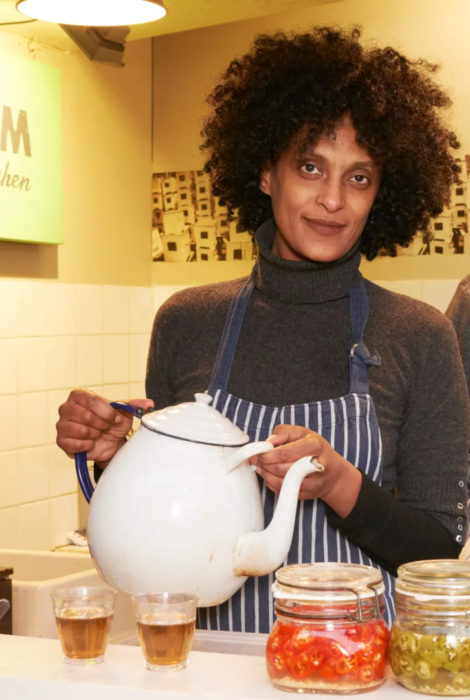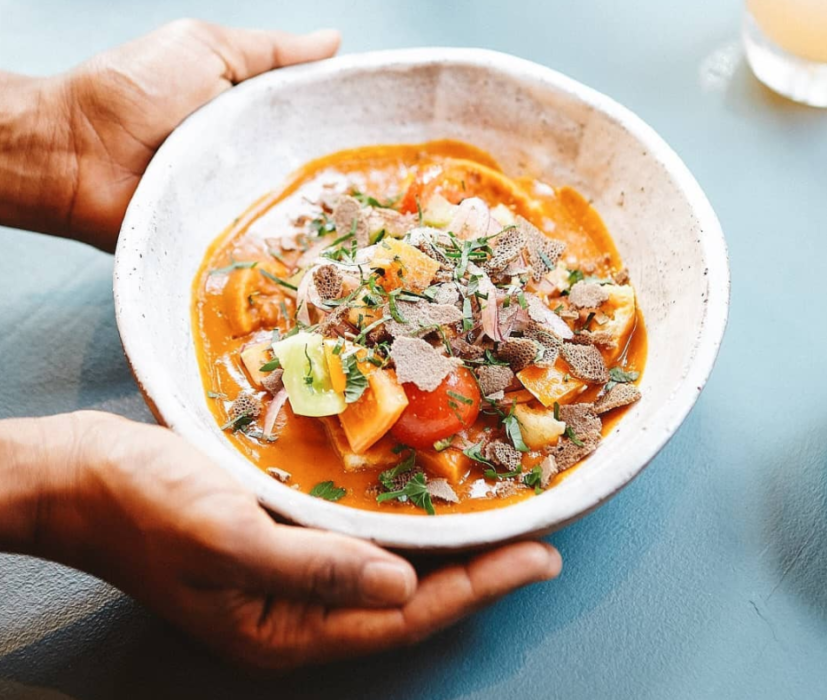Navigating A PLANT-BASED Diet As A Woman Of Colour: Makda Harlow

The mainstream wellbeing narrative at present is heavily focused on reducing meat in our diets, pushing a healthier way of eating that is also kinder to our planet. Over the last decade, we have seen a significant rise of popular documentaries, books, blog posts, celebrity endorsements and oddly placed adverts on the underground educating even the biggest meat lover amongst us to both the personal and environmental benefits of plant-based eating. Numerous studies have found that shifting to more plant-based meals reduces the risk of heart problems, cancer, diabetes, kidney disease, etc… , as well as boosts overall energy levels and generates the kind of natural skin glow that every beauty junkie craves. And in terms of the planet, reducing meat consumption, particularly beef in the western world, will dramatically lessen greenhouse emissions and a host of other environmental issues caused by industrial livestock production.
Whether a fad or not, the message is loud and clear. Yet, as more people jump on the meat-free bandwagon and public discourse calls for lifestyle shifts in response to scientific evidence, the presentations and discussions around the plant-based diet movement in the West tend to be rather whitewashed – often leaving people of colour out of the conversation when these diets have existed in many of our communities for centuries. In fact, a lot of the items promoted in the movement, such as tofu, lentils and even the sacred avocado, are not western foods originally, whereby diets in the UK and USA centre predominantly around the consumption of animal proteins. In contrast, for people of colour, there has been a growing interest in decolonising our diets, to resist the americanization of our foods and embrace ancestral knowledge that draws mostly on plant-based diets as a means of reclaiming our cultures and overall wellbeing.
Not everyone will be interested in becoming plant-based-all-the-time, and the logistics of navigating a lifestyle switch to eating more plant-based in a fast-paced city like London can feel overwhelming, particularly when the wellness industry ignores the varying cultural backgrounds of potential consumers. In an effort to place more women of colour within the conversation, BASE has reached out to 3 independent chefs (all women of colour from different cultural backgrounds) to explore the realities and practicalities of contemporary plant-based eating as people of colour today.
This week we interview Makda Harlow of Lemlem Kitchen, spoiler: there are recipe suggestions to try at home too!
We started LK just over 5 years ago, up until then I had worked in fashion and it was only after Jack and I had our second child that going back to work for someone else no longer made sense. Apart from a little waitressing work I had done, neither of us had worked in food before 2014 when we came up with our idea for Lemlem Kitchen. We’d both always cooked a lot and realised that no-one was doing modern things with these incredible flavours. London has many traditional Eritrean and Ethiopian restaurants that serve really delicious traditional dishes, but we felt there was a gap that we could jump into.

The one thing everyone always remembers about Eritrean food is injera, the fermented flatbread that is traditionally used as both a base to serve food on and to scoop and mop up the food when eating with one’s hands. The other common ingredient is berbere, a chilli based powdered spice mix that is used in most of our stews. There are also many other dried pulses used in dishes alongside vegetables dishes and salads.
Our food is very similar to Ethiopian cuisine, but a little lighter with less clarified butter and more tomato used. Growing up in the capital Asmara, Italian food was also a big factor but always with traditional ingredients too, so spaghetti with a spicy tomato sauce that had been made with berbere. We’d even have spaghetti with injera.
Historically most of our food comes from before refrigeration was widely available, so strong spices and slow cooking would kill bacteria, pulses and grains would be dried and ground then rehydrated for cooking and fermentation was common in sauces and injera.
In Eritrea, one of the main religions is Tewahedo Christian Orthodox. In our orthodox calendar, there are over 100 so-called fasting days. On these fasting days, known as ‘Tsom’, no meat, dairy or egg is consumed. This means there is a great range of what is now known in western diets as ‘plant-based’ dishes and why Eritrean restaurants are so popular with followers of this kind of diet.
Because of the way I was brought up I have always eaten a balanced diet, with more plant-based meals than not – meat was always a luxury growing up, just eaten on special occasions. In the UK, I try to eat as seasonally as possible as there is such wonderful local produce available all year round.

It’s already there – we’ve been doing it for thousands of years! I definitely feel the benefit of eating more plant-based food and do try to implement the idea with my family and business. At our last pop-up, 50% of the dishes on the menu were plant-based.
These dishes are often found on a Naytsom Beb’aynetu platter, all can be served together on injera or if you can’t find injera then delicious with any other flatbread.
Timtimo (spiced red lentils)
Ingredients:
250g split red lentils
1 white onion finely chopped
3 cloves garlic minced
Thumb-size piece fresh ginger minced
4 tablespoons sunflower oil
1 tablespoon berbere spice (can be found online, in specialists stores or larger supermarkets)
Method:
1. Rinse and drain lentils. Place lentils into a large pan of boiling water for 13-15 minutes until al dente.
2. Drain with a sieve but keep the boiling liquid.
3. In a different pan, heat the oil over a low heat then add onions and cook for 10 minutes until soft then add garlic and ginger and cook for a further 4 minutes.
4. Then add berbere, cover and cook on a low heat for around 10 minutes. You can add a little water if the onion looks dry.
5. Add lentils, season and cook for another 8 minutes before adding around 100ml of the boiling liquid then cook for another 5 minutes.
Hamli (Kale)
Ingredients:
500g Kale
4 cloves garlic minced
2 tablespoons sunflower oil
Method:
1. Wash kale and remove tough centre stems. Cut leaves crossways in 2cm strips.
2. In a large wok or wide pan, heat the oil over a low heat then add onions and cook for 10 minutes until soft then add garlic and cook for 2 minutes.
3. Then add the kale and mix well, season, cover and cook for 20-25 minutes. Add a little water if the kale starts to look too dry.
Birsen (yellow split pea)
Ingredients:
250g yellow split peas
1 white onion finely chopped
3 cloves garlic minced
Thumb-size piece fresh ginger minced
4 tablespoons sunflower oil
¼ teaspoon turmeric powder
1 jalapeno/green chilli halved (optional)
Method:
1. Rinse and drain split peas, then place them into a large pan of boiling water for 50-60 minutes until al dente. Drain with a sieve but keep the boiling liquid.
2. In a different pan, heat the oil over a low heat, then add onions and cook for 10 minutes until soft, then add garlic and ginger and cook for a further 4 minutes.
3. Then add turmeric, cover and cook on a low heat for around 10 minutes. You can add a little water if the onion looks dry.
4. Add split peas, season and cook for another 10 minutes before adding around 150ml of the boiling liquid and halved green chilli then cook for another 5 minutes.
Follow: @elviravedelago and @lemlemkitchen
We've got great things to share!
Sign up for our weekly newsletter
and we'll keep you updated.
You can unsubscribe at any time
Terms & Privacy